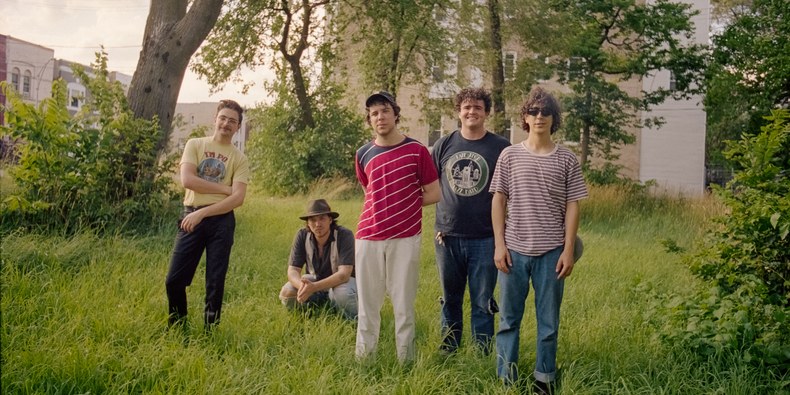Spotlight: Twin Peaks

In February 2019, Twin Peaks traveled to Wales to record their fourth LP, Lookout Low, with famed producer Ethan Johns. And while they were excited to be living and recording at the remote Monnow Valley Studios, they had no clue that the facility had a haunting, almost supernatural energy.
“The story is that Ozzy Osbourne used to record there with Black Sabbath, and he opened a portal or something in the house with a Ouija board,” bassist Jack Dolan recalls, sitting with two of his bandmates in Relix’s New York City offices. “Everyone was having sleep paralysis and really weird dreams. Everything was weird after we learned about that.”
And the weirdness continued in the studio, as Johns—who has produced everyone from Paul McCartney to White Denim to Joe Cocker—took the band outside of their comfort zone, ditching their usual multi-take style in favor of raw, in-the-moment recordings that reflect their unrestrained live shows.
“This is the first time we’ve worked with a producer, really,” explains guitarist/ singer Cadien Lake James, as he flips through a Grateful Dead photo book. “We’ve always run our own ship. So it was just different off the bat. He was like, ‘I only record the vocals with the band—live. It’s all happening at once,’ which we’ve never fucked around with in the past, but it seemed like a worthwhile challenge for ourselves. He came in the first day with his long, white beard and Dead shirt on, and I was like, ‘Oh, we’re going to get along with him.’”
Since their founding in 2010, Twin Peaks’ cigaretteinfused, beer-soaked sound has won them choice slots at top-tier events like Pitchfork Music Festival and Outside Lands. Yet, as their excitement about Johns’ Grateful Dead shirt reveals, in recent years, an undeniable acid-washed aesthetic has seeped into their repertoire. From longer jams onstage to a merch collaboration with Grateful Dead parking-lot purveyor Online Ceramics, the band has become more aligned with the Dead than ever before.
“For me, that was a huge thing—getting into the Dead,” James explains. “But also just realizing that there is a misunderstanding of the term ‘jamband’ and the box people put it in. It’s the same shit we’re rooted in. They were an Americana rock-and-roll band that happened to take long solos and improv. That changed it for me and made it feel a lot more relatable to what we do.”
Across the table, bespectacled guitarist/ keyboardist Colin Croom agrees; a dash of improvisation, à la Jerry Garcia, continues to breathe new life into the Twin Peaks live show. “I’ve always related to Jerry’s idea of not repeating the same things,” he says. “It’s one thing to learn the part. Anyone can learn that if they sit there and practice it every day. But it’s about the mental position that you have to be in for live improvisation. You need to cut the ego and remove the distance between being a room by yourself—just noodlin’ around—and being in front of hundreds or thousands of people, without repeating the same thing over and over again. We’ve built little nooks for improvisation, and now I feel like we’re getting more comfortable with shaping that every show.”
“We’re definitely not on some total Dead shit where we’re playing 15-minute versions of songs,” James counters. “But the song ‘Blue Coupe’ from Sweet ‘17 Singles has a solo at the end where we are both improvising. It might go 60 seconds or it might go three minutes. It’s really exciting—you don’t know where you’re going to go.”
Before heading to Wales, Twin Peaks demoed over two dozen potential songs for Lookout Low in the comfort of their Chicago studio, plugging away at the compositions five days a week and trying out different tempos and style variations until one stuck. “Dance Through It,” for example, saw the band leaning into their home city’s deep history of blues and soul. “I think everyone has an appreciation for that style of music. It was a natural, instinctual thing, in a way,” Croom explains.
James describes “Dance Through It” as “a groovy-ass tune” that finds the band trading their usual high-energy fuzz for a smoother sound. Overall, James, Dolan and Croom (along with singer/ guitarist Clay Frankel and multi-instrumentalist Connor Brodner, who were not present for this interview) see this as a new, highly collaborative era for Twin Peaks, where they can solidify their vision through conscious risk-taking. The band wanted the music on Lookout Low to feel intentional, yet they encouraged a more open-ended writing style. “At first, ‘Dance Through It’ was something that had a totally different vibe,” James recalls. “When we got together in the practice room, it was like, ‘Let’s try this thing.’ It’s a radically different groove for us. It’s one of those things that I would probably laugh about before, getting this groove. It seemed crazy. But when we played it, it was like: ‘Oh, this feels great, this works.’”
Lookout Low dropped in mid-September, and the beauty of being Chicago’s hometown heroes (at least in the indie sphere) is that Twin Peaks know their fans will be at their shows, embracing both their old and new music. And they rely on a palpable, jambandlike energy exchange with their audience—as long as they’re willing to get onstage and give their all, they have their city’s support.
“It’s a direct relationship,” Croom concludes. “Even if you’re not necessarily looking at the crowd the entire time, you can feel it. The energy is there.”




















